Reeves’ approval ratings mirror Kwarteng’s post mini-budget as over half of Britons think the UK is now in a period of austerity. Public is split on the key decisions and trade-offs facing the Chancellor ahead of the Spending Review
Ahead of the Spending Review on the 11th of June, new polling data from Ipsos in the UK reveals that just over half (54%) of Britons believe Britain is in a period of austerity, as Chancellor Rachel Reeves’ approval ratings mirror those of Kwasi Kwarteng following the 2022 mini-budget.
Economic confidence continues to be low as Reeves’ approval ratings mirror Kwarteng’s post mini-budget
- Half (51%) of Britons say that Rachel Reeves is doing a bad job as Chancellor (16% good job). These ratings are near identical to Kwasi Kwarteng’s in the aftermath of the September 2022 mini-budget.
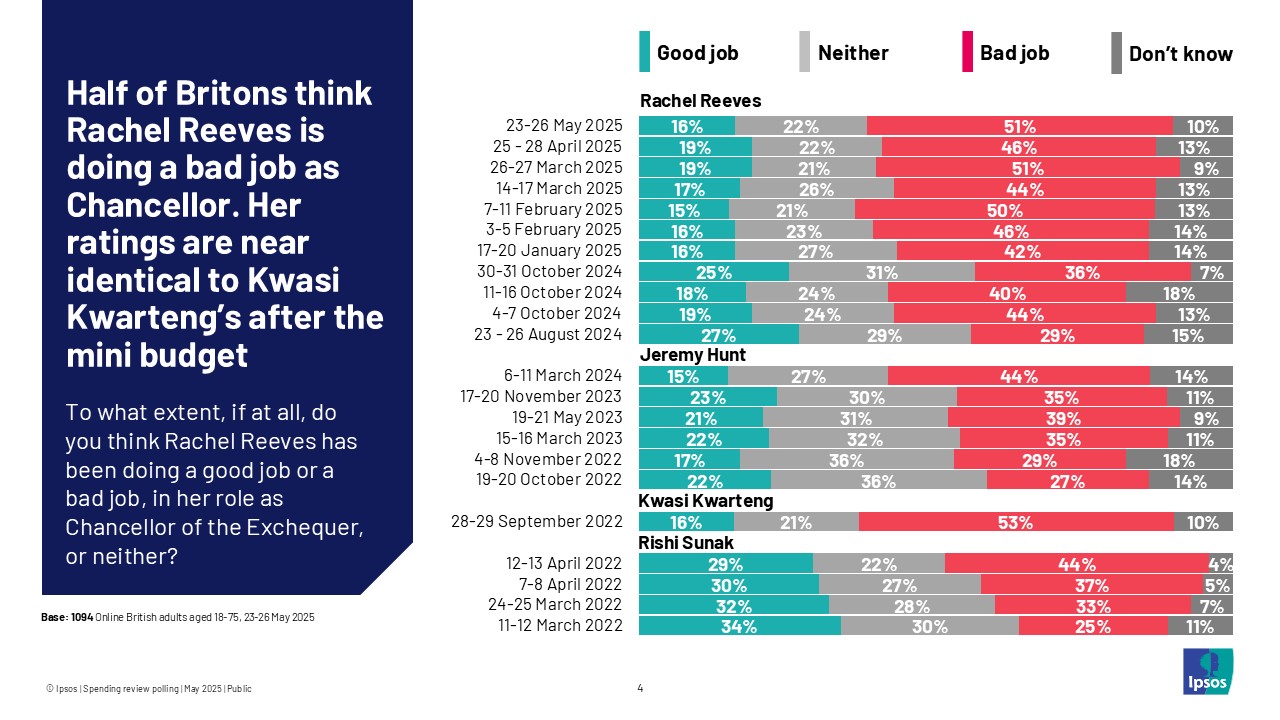
- Almost three in four (73%) Britons believe the economy is currently in a poor state, while a quarter (24%) believe it is in a good state, little changed since April.
- Looking ahead to one year’s time, the public remain pessimistic, with 63% overall expecting the economy to continue to be in a poor state. Labour 2024 voters are split, with 46% each expecting the economy to be doing well or badly in a year’s time. Conversely, seven in ten (70%) Conservative voters, and 83% of Reform UK voters, expect the state of the economy to remain poor.
- A majority of the public (54%) believe the UK is currently experiencing a period of austerity, a perception that is relatively consistent among all age and voter groups, rising to 65% among Reform UK voters. When asked what things they think of when considering austerity, people are most likely to mention rising inflation (43%), a stagnant economy (42%), and the quality of public services getting worse (38%).
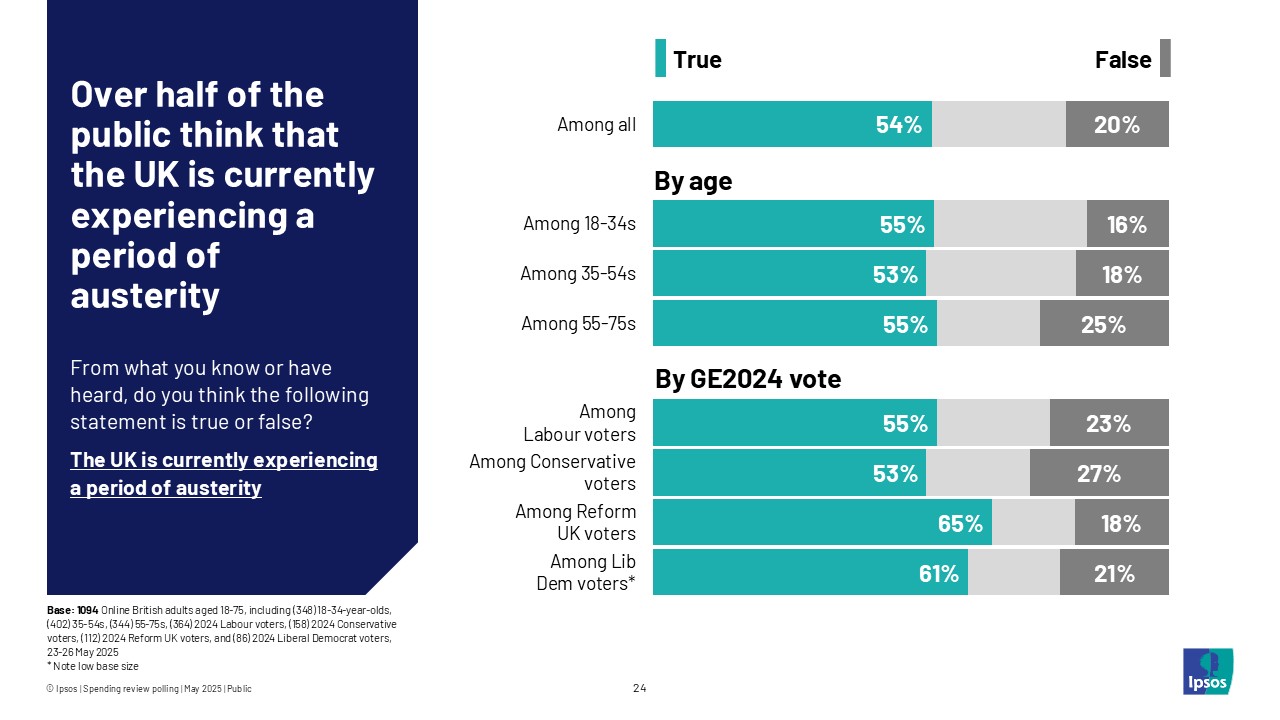
- Ipsos’ Economic Optimism Index asks Britons whether they think the general economic condition of the country will improve, stay the same, or get worse over the next twelve months, and has been tracking the economic mood of Britons since 1978. The latest results show 15% think the economy will improve, and 63% get worse, giving a net figure of -48. This has rebounded somewhat from the historic low of -68 seen in April of this year, but is still well below the long-term average of -17.
- The net Economic Optimism Index figure of -48 is comparable to the EOI rating under former Prime Minister Boris Johnson (-47) at the equivalent point into his premiership in June 2020, around the time of the first COVID-19 lockdown. However, the current rating of -48 is not as bad as those experienced by Margaret Thatcher and Gordon Brown at the equivalent points in their premierships in early 1980 and 2008 respectively.
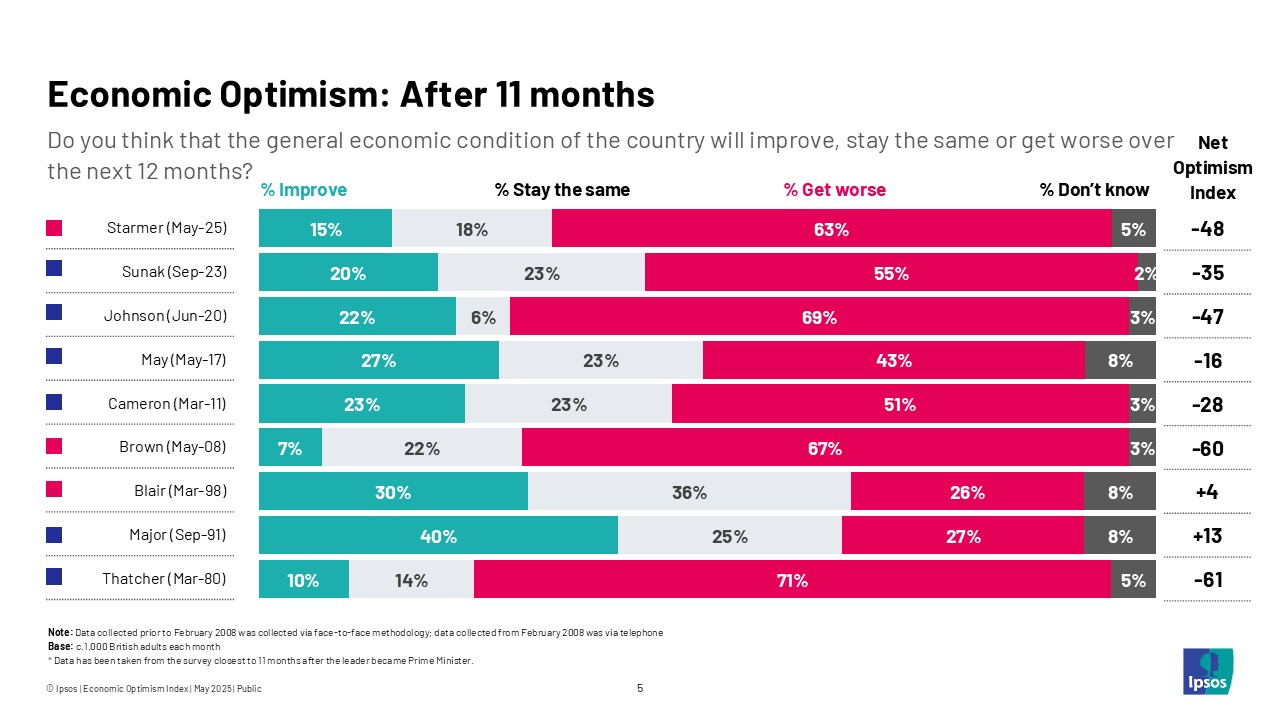
Labour has small lead as most trusted to manage the economy, improve public services, with Reform UK in second
- Labour continues to have a small lead as the most trusted party to manage the economy (20%), followed closely by Reform UK (17%) and the Conservatives (16%).
- A quarter (25%) of Britons say that they also trust Labour most to improve Britain’s public services. Reform UK is in second on 17%, while the Conservatives are on 11%.
- However, seven in ten (72%) believe that Labour will personally increase the taxes that they personally pay over the next year, a figure that has been relatively consistent since just after they were elected in August 2024, although higher than expectations just before they were election in May 2024 (56%). Four in ten (40%) believe the government will increase spending on public services, down from over half (55%) in August 2024 and 59% before the election.
What do Britons want from the Spending Review?
- The public is split on whether the Chancellor should increase borrowing to spend more on public services (35%) or reduce borrowing to cut the national debt (34%). However, when asked what others think, the public mostly do not realise the correct picture, being slightly more likely to think that other British adults are more likely to say they would prefer for more to be spent on public services (38%), rather than reducing borrowing to cut the national debt (23%) – 23% correctly guess that support is relatively equal for both options.
- Similarly, Britons are split (34% each) on whether they would want to pay more tax if it led to an increase in spending on public services, or whether they want to cut taxes even if it means less spending on public services. However, when asked what they believe others think, the public overestimate support for tax cuts (45% think more people in Britain prefer cutting taxes, 20% think more people prefer increased spending, and 21% that support for both options is relatively equal).
- Elsewhere in the poll, the public was asked a series of open-ended questions about what the spending review might bring. These responses were then analysed using Ipsos’ bespoke AI tool, Ipsos Facto, into five key themes:
- “What would you most like to see announced in the Spending Review?"
- Measures to address the cost of living/inflation
- Increased spending on public services – especially the NHS
- Tax cuts (especially for lower/middle earners)
- Reduce spending on immigration/asylum seekers
- Winter Fuel Allowance reinstatement
- "And what are your biggest concerns about the Spending Review?"
- Tax increases
- Cuts to public services
- Increased national debt/borrowing
- Cost-of-living crisis worsening
- Lack of confidence/trust in Government’s ability to manage finances/public spending/deliver improvements
- “What would you most like to see announced in the Spending Review?"
- The British public are not confident that the announcements in the spending review will improve the quality of public services, Britain’s economic growth, or their family’s personal finances, either in the short or medium term.
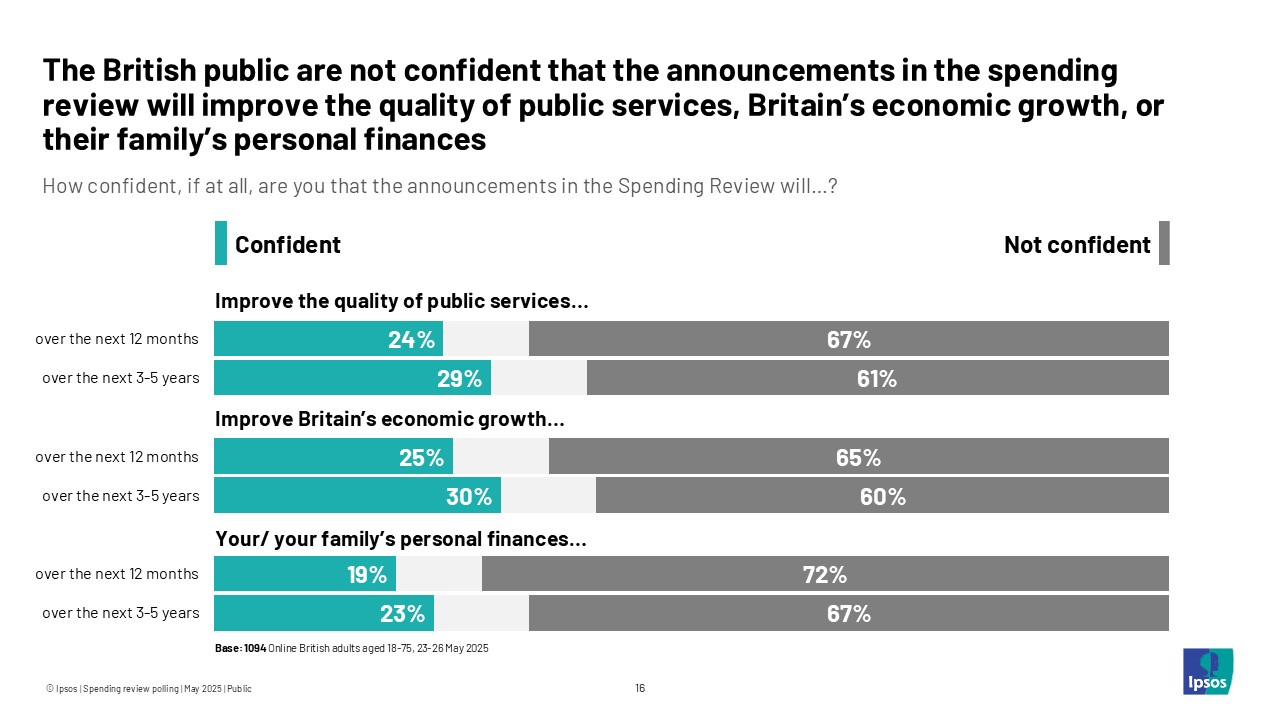
NHS continues to be the top priority – but support for more spending on health falls if it reduces quality of other services
- When it comes to public spending, the NHS/healthcare is overwhelmingly the area that the public believes should receive more investment (63%), followed by border and immigration control (25%) and social care (22%). In contrast, almost half of Britons (48%) think foreign aid should receive less public spending.
- While there's some support for reducing spending on other public services to increase NHS spending, this is heavily dependent on whether it impacts the quality or availability of those other services. 39% would support this if it doesn't reduce quality, but 46% would oppose if it does.
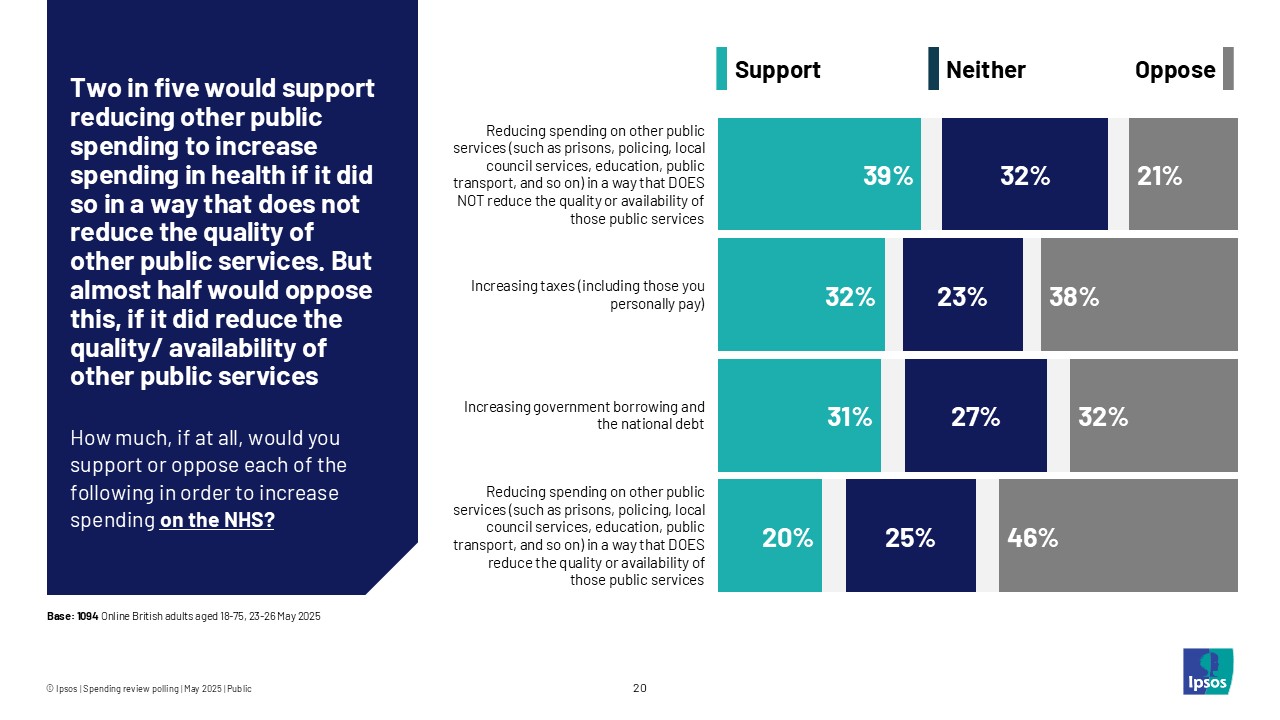
- A third (32%) would support reducing other public spending to increase spending in defence if it did so in a way that does not reduce the quality of other public services. But half (50%) would oppose this, if it did reduce the quality/ availability of other public services.
- 45% of Britons believe it's possible to find extra money for the NHS and defence by making other public services more efficient (rising to 60% of Conservative voters and 56% of Reform UK voters), compared with 31% who think efficiency savings alone won’t cover the extra spending. However, even among those who think it is possible to find extra money through efficiencies alone, over half (55%) are not confident that the actual result would be no reduction in the quality or availability of those other services (38% confident).
Commenting on the findings, Gideon Skinner, Senior Director of UK Politics at Ipsos, said:
These figures paint a concerning picture for the government heading into the Spending Review on June 11th. Rachel Reeves' approval ratings mirroring Kwasi Kwarteng's post-mini-budget levels is a stark indicator of entrenched public dissatisfaction with the current economic climate and the state of Britain’s public services. The fact that a majority of Britons believe we are in a period of austerity, coupled with pessimism about the economy's future, suggests a real challenge for the Chancellor, with the public’s judgements based on their tangible experiences of the cost of living, the state of the economy, and the quality of public services. While Labour maintains a small lead in trust for managing the economy and public services, the public's expectation of increased taxes but not in return for much more money for public services highlights a lack of confidence that the spending review will deliver improvements over the short or medium term. The NHS remains the overwhelming priority for increased investment, but the public is wary of cuts to other services to achieve this. The desire for efficiency savings is present, but scepticism remains about whether this can be achieved without impacting service quality. There may be little comfort for the Chancellor that the public themselves are split on the key choices, increasing spending, cutting taxes or controlling borrowing, but the dilemma facing the government remains the same: how to manage the public’s dual desire to address the cost of living and keep taxes low, while also wanting to see investment to improve public services.
Technical note:
- For the Economic Optimism Index data, Ipsos interviewed 1,004 British adults aged 18+ by telephone from the 7th-13th May 2025.
- For the rest of the Spending Review polling, Ipsos interviewed a representative sample of 1,094 adults aged 18-75 across Great Britain. Polling was conducted online between the 23rd and 26th May 2025.
- Data are weighted to match the profile of the population. All polls are subject to a wide range of potential sources of error.




